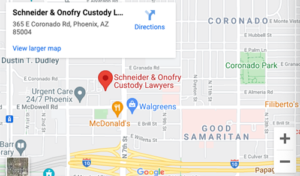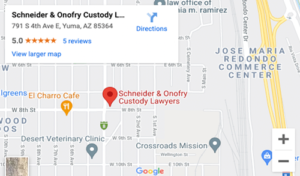Adoption
We represent adoptive parents in a variety of adoption scenarios, including:
- foster care/DCS adoption
- stepparent adoption, including same-sex parent adoption
- grandparent adoption (and adoption by other relatives)
- private adoption, with or without an adoption agency
- international adoption
- contested and uncontested
Our adoption services include all aspects of filing for the adoption through the final adoption hearing. We also assist adoptive parents in termination of parental rights by one or both birth parents (consent, severance, etc.) and, where appropriate, facilitating communications and arrangements between adoptive parents and birth parents.
What are the qualifications and requirements for adopting a child in Arizona? You must be an adult (age 18 or older) and a legal Arizona resident. You may be married, unmarried or legally separated.
What is the adoption process? If you are a stepparent, grandparent, or other close relative, you start by filing a Petition to Adopt and complying with Arizona’s requirements relating to fingerprints, Arizona Department of Child Safety records, and the putative father’s registry search.
For all others, you start by getting certified to adopt a child in Arizona. Certification is obtained through an adoption home study, conducted by a private or public adoption agency, that determines your fitness to adopt. Factors influencing your fitness include your physical and mental health, financial condition, life expectancy, criminal record, etc. A home study generally takes two to three months for a domestic adoption and somewhat longer for a foreign adoption.
How long does an adoption take? There are many factors that affect the time required to complete the adoption, and there is no official duration. It is not uncommon for stepparent and relative adoptions to be completed in four to six months and for other domestic adoptions to be completed in about a year. Foreign adoptions generally take longer.
How much does an adoption cost? The costs of adopting a child vary greatly with the circumstances. Private adoption can involve legal fees, agency fees, travel expenses, court-approved birth mother expenses, health insurance co-pays and deductibles, etc. Where needed, costs would also include legal fees for terminating the rights of one or both birth parents.
How does one get information about children who are available for adoption? The three main sources are (1) adoption agencies, (2) a birth mother who wishes to place her unborn child for adoption, and (3) for foster adoption, the Department of Child Safety.
What types of consent are required from the child’s birth parents or other individuals? State law (A.R.S. § 8-106) requires that consent be obtained from the child’s birth or adoptive mother (if she is living), and, under certain conditions, from the child’s father. Those conditions include any of the following: (a) the father was married to the child’s mother at the time of conception or at any time between conception and the child’s birth (with certain statutory exceptions); (b) the father has adopted the child; or (c) the father’s paternity has been established.
Under certain circumstances, consent may be required from (a) the child, if he or she is age 12 or older; (b) the child’s legal guardian, if one has been appointed; and/or (c) an adoption agency that has received legal consent to place the child for adoption.
Can a parent change their mind after they have terminated their parental rights? They might have second thoughts, but if they were of a sound mind and free of undue influence when they signed properly prepared severance documents, in the great majority of cases the courts will enforce the termination of parental rights.
I have heard of “closed,” “semi-open” and “open” adoptions. What do those terms mean? In a “closed” adoption, you have no knowledge of the birth parents, nor do they have any knowledge of you.
A “semi-open” adoption generally pertains to a situation in which the adoptive parents and the birth mother become acquainted before the baby is born, but, after birth, the birth mother generally has no direct contact with the child.
In an “open” adoption, the adoptive family and the birth family stay in touch, allowing the child to have a relationship with both.
How is the adoption finalized? In Arizona, adoptions are within the jurisdiction of the Juvenile Court system. After the adoption petition has been filed and all legal requirements have been met, you and your adoptive child, and in some cases your spouse, will go before a judge, and the judge will rule on the petition and determine whether to grant the adoption.















